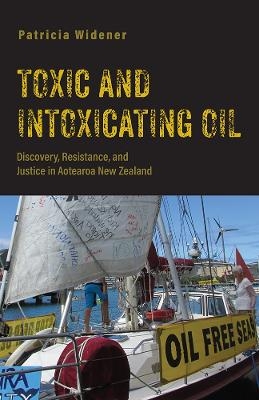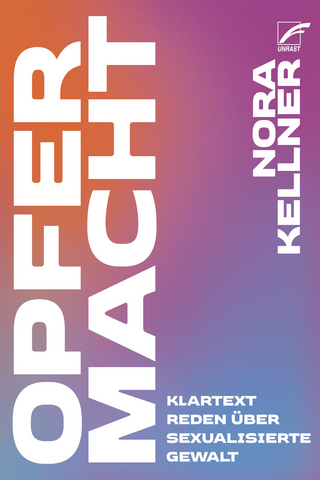
Toxic and Intoxicating Oil
Rutgers University Press (Verlag)
978-1-9788-0503-3 (ISBN)
When oil and gas exploration was expanding across Aotearoa New Zealand, Patricia Widener was there interviewing affected residents and environmental and climate activists, and attending community meetings and anti-drilling rallies. Exploration was occurring on an unprecedented scale when oil disasters dwelled in recent memory, socioecological worries were high, campaigns for climate action were becoming global, and transitioning toward a low carbon society seemed possible. Yet unlike other communities who have experienced either an oil spill, or hydraulic fracturing, or offshore exploration, or climate fears, or disputes over unresolved Indigenous claims, New Zealanders were facing each one almost simultaneously. Collectively, these grievances created the foundation for an organized civil society to construct and then magnify a comprehensive critical oil narrative--in dialogue, practice, and aspiration. Community advocates and socioecological activists mobilized for their health and well-being, for their neighborhoods and beaches, for Planet Earth and Planet Ocean, and for terrestrial and aquatic species and ecosystems. They rallied against toxic, climate-altering pollution; the extraction of fossil fuels; a myriad of historic and contemporary inequities; and for local, just, and sustainable communities, ecologies, economies, and/or energy sources. In this allied ethnography, quotes are used extensively to convey the tenor of some of the country’s most passionate and committed people. By analyzing the intersections of a social movement and the political economy of oil, Widener reveals a nuanced story of oil resistance and promotion at a time when many anti-drilling activists believed themselves to be on the front lines of the industry’s inevitable decline.
PATRICIA WIDENER is an associate professor of sociology at Florida Atlantic University in Boca Raton and author of Oil Injustice: Resisting and Conceding a Pipeline in Ecuador. She conducts allied qualitative research to advance an understanding and practice of climate, environmental, and marine justice, and to shed light on the socioecological risks of oil from its extraction to waste disposal. Currently, she is researching the impacts of extractive marine economies and regenerative aquatic practices among coastal communities and marine advocates. When in residence in Florida, she conducts regional studies on climate change and activist campaigns. Before studying sociology, she worked as a journalist for six years in Bangkok, Thailand, and Southeast Asia.
Table of Contents
Acknowledgements
Chapter 1: Which Way Aotearoa New Zealand?
Kia Ora: Welcome to the Bottom of the World
Becoming another Oil Story
A Social Analysis of Oil Advocacy & Resistance
Chapter 2: An Allied Ethnography
Critical Place
Ethical Comparisons
Surveillance
Banking Time
Chapter 3: Dominant & Critical Oil Narratives
Three Flows of Oil
New Zealand’s O&G History
Dominant Oil Paradigm
Critical Oil Paradigm
Chapter 4: Oil at the Bottom of the World
Cultural Capture & Conflict
Regulatory Capture & Toxic Alliances
Accommodating Extraction: Then & Now
Preserving Cultural or Capital Taonga?
Chapter 5: License to Criticize: From Disasters to Resistance
Routinization of Violence
Oil Promises, Human Losses
Rena: An Oil & Cargo Spill
“A Little Government Waits”
Sweat Equity, 8000-Strong
Distinctly Māori
National Resistance: Now-or-never Focusing Events
Illusions of Recovery & Safety
Chapter 6: Marine Justice: Defending the Seas, Claiming the Coastline
Coastal & Saltwater Sociology
A Harbinger: Punching beyond the Shoreline
Māori vs Petrobras
The “Dodgy Bullshit” of Anadarko
Greenpeace: An Ideal Type of Resistance
Kaikoura: Kaitiaki & Whale-watching
Otago’s Natural Gas & Divided Alliances
Marine Justice: Whose Ocean? Our Ocean?
Chapter 7: Mobilizing the Middle: Ka Nui! “No Mining, No Drilling, No Fracking, Enough!”
Unconventional Technologies, Controversial Impacts
Rousing the Middle
“Their Truth:” Global Flow of Citizen Knowledge
From Taranaki, with Intent
Problematizing Taranaki
Enabling a Sacrifice
Chapter 8: Tainting a Clean, Green Image
Pure Products, Green Jobs
Generational Pride, Ecocultural Consciousness
Realism or a “Green Mirage”?
Greenies Silenced by Association
Hypocrite Drivers
“Feeling a Bit Under Siege”
Aotearoa Justice
Chapter 9: Oil: Catalyst for Reviving Climate Activism
Inverse Accounting
“The Failure of the World”
Re-energizing the Frontlines
“Bubbling Away Underneath”
Bind of a Spill
Struggle to Localize Impacts
Intergenerational Worry
Chasing Global Justice
Chapter 10: Disrupting Oil for Transformative Justice
Applying Critical Environmental Justice
Advancing Just Transitions
About the Author
References
Index
| Erscheinungsdatum | 09.03.2021 |
|---|---|
| Reihe/Serie | Nature, Society, and Culture |
| Zusatzinfo | 10 b-w images |
| Verlagsort | New Brunswick NJ |
| Sprache | englisch |
| Maße | 152 x 229 mm |
| Gewicht | 4 g |
| Themenwelt | Sozialwissenschaften ► Ethnologie |
| Sozialwissenschaften ► Politik / Verwaltung ► Politische Theorie | |
| Sozialwissenschaften ► Politik / Verwaltung ► Staat / Verwaltung | |
| Sozialwissenschaften ► Soziologie | |
| Technik ► Umwelttechnik / Biotechnologie | |
| Wirtschaft ► Volkswirtschaftslehre ► Wirtschaftspolitik | |
| ISBN-10 | 1-9788-0503-9 / 1978805039 |
| ISBN-13 | 978-1-9788-0503-3 / 9781978805033 |
| Zustand | Neuware |
| Haben Sie eine Frage zum Produkt? |
aus dem Bereich


